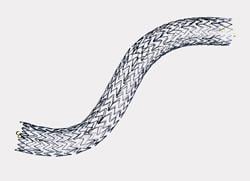
September 24, 2010 – Drug-eluting stents are beneficial in treating symptomatic peripheral artery disease (PAD) in the femoropopliteal artery. Data from the ZILVER PTX trial demonstrate that paclitaxel-eluting stents had significantly better 12-month patency rates compared to traditional angioplasty with bare-metal stents for lesions in the femoropopliteal artery (above the knee).
The results for the trial, which studied Cook Medical's self-expanding Zilver PTX, were presented at the Transcatheter Cardiovascular Therapeutics (TCT) 2010 meeting in Washington, D.C.
“This is an important step toward reducing amputations, bypass and repeat intervention surgeries in patients with peripheral artery disease, which is very difficult to treat,” said Michael D. Dake, M.D., the Thelma and Henry Doelger professor in the department of cardiothoracic surgery at Stanford University School of Medicine.
PAD is a condition in which the arteries in the legs become narrowed or blocked, similar to coronary artery disease. Diabetics, smokers and those with high blood pressure or cholesterol are at risk of PAD.
In the study, at 12 months, the patency rate – the degree to which the artery was opened – was 83.1 percent with the drug-eluting stent and 67 percent with standard care (angioplasty with provisional bare stenting). Also, at 12 months, the rate was 89.9 percent with the drug-eluting stent and 73.0 percent with the bare-metal stent (in a head-to-head comparison of provisional stenting), demonstrating that the drug effect was significant.
The trial, which began in 2005 and reached its primary endpoints in 2010, is a prospective randomized trial with 479 patients at 55 trial sites in the United States, Japan and Europe.
In June, the polymer-free, drug-eluting Zilver PTX was submitted for premarket approval (PMA) to the U.S. Food and Drug Administration (FDA) for use in the superficial femoral artery (SFA).
For more information: www.crf.org or www.cookmedical.com


 January 05, 2026
January 05, 2026 









